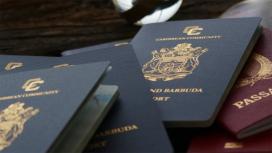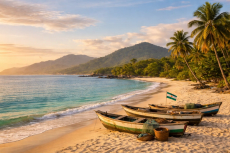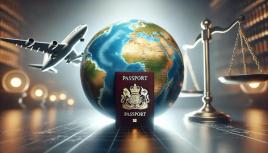Blog • Published on:September 8, 2025 | Updated on:September 18, 2025 • 16 Min
Why More Investors Are Choosing Caribbean Passports in 2025
For decades, the Caribbean has attracted global investors seeking second citizenship through well-structured and reputable programs offered by five island nations, Antigua and Barbuda, Dominica, Grenada, Saint Kitts and Nevis, and Saint Lucia.
In 2025, these programs remain strong and are adapting to new realities. Governments across the region have agreed to introduce a 30-day annual residency requirement for approved applicants, balancing accessibility with closer ties between investors and their chosen countries.
At the same time, the islands are improving connectivity, tourism, and infrastructure, factors that directly enhance the value of holding citizenship.
Key Connectivity Developments
- Dominica is upgrading access dramatically: its first international airport, slated to open in 2026, will accommodate larger international flights from Europe, North America, and the wider Caribbean, boosting future investor and tourist arrivals.
- Caribbean Airlines has inaugurated a direct flight between Dominica and Puerto Rico, plus enhanced routes from Trinidad that now include frequent connections to New York and Toronto. These flights restore vital regional links and bolster Dominica’s accessibility to major markets.
- Contour Airlines, entering the Caribbean market for the first time, is launching nonstop jet service connecting Dominica with St. Thomas (U.S. Virgin Islands) and Puerto Rico.
- On the Antigua and Barbuda front, a new digital arrival and departure system at VC Bird International Airport streamlines immigration by allowing travelers to submit customs and passport information online. This tech-driven enhancement is a significant improvement to the travel experience.
With these developments, Caribbean citizenship is an access to a region investing in long-term growth, mobility, and international standing.
Understanding Caribbean Citizenship by Investment Programs
Overview of CBI Programs in the Caribbean
Five Eastern Caribbean countries, Antigua and Barbuda, Dominica, Grenada, Saint Kitts and Nevis, and Saint Lucia offer formal citizenship-by-investment (CBI) programs.
These initiatives allow qualifying investors to obtain full citizenship rights in exchange for a financial contribution, typically through government funds, real estate purchases, or approved business ventures.
The programs are not only a source of global mobility for investors but also a vital part of national development strategies.
Funds are directed toward infrastructure, healthcare, education, and climate resilience projects, strengthening local economies.
Historical Context and Program Credibility
The Caribbean pioneered citizenship by investment. Saint Kitts and Nevis launched the world’s first official CBI program in 1984, setting the model that others followed.
Over the past four decades, these programs have become trusted and regulated pathways for investors, attracting thousands of applicants from around the world.
Caribbean governments have reinforced their credibility by implementing strict due diligence checks, ensuring that only reputable investors qualify. International bodies, including the OECD and U.S. regulators, closely monitor compliance.
This has positioned Caribbean programs among the most established in the world.
New Residency Requirement
In September 2025 regional leaders announced a 30-day annual residency requirement for CBI citizens, aimed at strengthening ties between new citizens and their chosen country.
While previously there were no obligations to spend time on the islands (with the exception of five days over the course of five years in Antigua and Barbuda), the new standard encourages engagement with local communities and economies without creating a heavy relocation burden.
This adjustment also aligns the Caribbean with evolving international expectations while keeping the programs attractive to investors seeking flexibility.
Benefits of Caribbean Second Passports
A Caribbean passport remains one of the most cost-effective and efficient ways to secure dual citizenship. Benefits include:
- Visa-free and visa-on-arrival travel to more than 140 destinations worldwide, including the UK, EU Schengen Area, Singapore, and China (varies by country)
- Tax advantages, such as no personal income tax on foreign-sourced earnings, no wealth or inheritance taxes, and favorable structures for asset protection
- Family inclusion, allowing spouses, children, parents, and in some cases siblings to apply under the same investment
- Business and lifestyle opportunities, supported by stronger flight connections, upgraded infrastructure, and emerging Caribbean hubs
With expanding global links and rising international recognition, Caribbean CBI programs continue to be among the most strategic options for investors planning a secure Plan B.
Comparing Caribbean CBI Programs: Investment Options
While the five Eastern Caribbean nations share many similarities in their citizenship-by-investment frameworks, each program has unique strengths.
Choosing the right one depends on factors like investment threshold, family size, lifestyle preferences, and long-term mobility goals.
Learn more about the different programs, their costs, and benefits in the Best Caribbean Citizenship by Investment Programs in 2025: A Complete Guide.
As the pioneer of CBI, launched in 1984, Saint Kitts and Nevis remains the most recognized program globally.
It offers several investment routes, including a contribution to the Sustainable Island State Contribution (SISC) fund, real estate purchases, and the Public Benefit Option.
- Minimum contribution: $250,000 (single applicant, SISC fund)
- Processing time: 6–12 months
- Highlights: Visa-free access to over 150 destinations, including the UK, EU, and Singapore
- It is also regarded as the strongest Caribbean passport in global rankings
Launched in 1993, Dominica’s CBI program is consistently ranked among the most affordable and reputable. It is also one of the most accessible for single applicants.
- Minimum contribution: $200,000 (Economic Diversification Fund)
- Processing time: 6-8 Months
- Highlights: Known for eco-tourism and a strong environmental focus, Dominica’s program will soon benefit from the opening of its first international airport in 2026, which will improve global access and boost property investment potential.
Grenada offers one of the most strategic Caribbean passports, especially for investors with U.S. ambitions.
- Minimum contribution: $235,000 (National Transformation Fund)
- Processing time: Around 6+ months
- Highlights: Grenada is the only Caribbean country with an active E-2 Treaty with the United States, allowing eligible investors to apply for U.S. residency through business investment. Family inclusion is broad, covering parents, grandparents, and unmarried siblings.
For insights into daily life, residency logistics, and the vibrant culture of Grenada, check out Living in Grenada: Caribbean Life & Residency.
Antigua and Barbuda is considered the most cost-effective program for larger families, offering unique benefits through the University of the West Indies (UWI) fund option.
- Minimum contribution: $230,000 (National Development Fund for a family of four)
- Processing time: 4-6 Months
- Highlights: Best value for families, with visa-free access to over 150 countries. One family member can receive a tuition-only scholarship at UWI under the UWI fund option
Introduced in 2015, Saint Lucia’s CBI program is the newest but also one of the most flexible, offering four distinct investment routes.
- Minimum contribution: $240,000 (National Economic Fund)
- Processing time: 4-6 Months
- Highlights: The only Caribbean program offering a fully refundable government bond option
- It also includes enterprise investment routes, giving investors a wider choice than other islands
Each program has its advantages, but all five provide efficient and internationally respected pathways to citizenship.
Your choice depends on whether you value the strongest global passport (Saint Kitts and Nevis), affordability (Dominica), U.S. treaty access (Grenada), family-friendly pricing (Antigua and Barbuda), or flexible investment options (Saint Lucia).
Investment Requirements and Processing Times
Caribbean CBI programs all require a qualifying investment, but the pathways and associated costs differ.
The main options are government contributions, real estate purchases, and in some cases, enterprise or bond investments.
Real Estate Investment Routes
All five Caribbean nations allow investors to obtain citizenship by purchasing property in government-approved developments. These usually include resorts, hotels, or villa projects that contribute to the tourism sector.
- Minimum thresholds range from $200,000 in Dominica to $325,000 in Saint Kitts and Nevis
- Properties must generally be held for at least five years before resale (seven years in Saint Kitts and Nevis)
- Investors often generate rental income, as properties are typically located in high-demand tourist destinations
Government Fund Contributions
Non-refundable donations to national funds remain the most straightforward route. These funds support local infrastructure, healthcare, education, and sustainable development.
- Dominica: $200,000 (Economic Diversification Fund)
- Antigua and Barbuda: $230,000 (National Development Fund, for families of up to four)
- Saint Kitts and Nevis: $250,000 (Sustainable Island State Contribution)
- Grenada: $235,000 (National Transformation Fund)
- Saint Lucia: $240,000 (National Economic Fund)
Processing Timeframes
Timelines are competitive compared to other global residency and citizenship programs:
- Saint Kitts and Nevis: 6-12 months
- Grenada: 6+ months
- Antigua and Barbuda: 4-6 Months
- Dominica: 6-8 Months
- Saint Lucia: 4-6 Months
Some governments also offer accelerated processing options, though these may require additional fees.
Due Diligence Procedures
Due diligence is a cornerstone of Caribbean CBI credibility. All applicants and dependents over a certain age (usually 16–18+) undergo background checks.
This includes:
- Verification of identity and source of funds
- Interpol, World-Check, and other international security screenings
- Mandatory interviews in Dominica, Grenada, and Saint Kitts and Nevis for applicants and dependents of eligible age groups
These procedures ensure program integrity, maintain international trust, and protect the value of Caribbean passports.
Benefits of Caribbean Second Citizenship
Caribbean CBI programs are designed to offer more than a second passport. They provide global mobility, tax advantages, and family security, while also opening doors to business and lifestyle opportunities in a region investing heavily in its future.
Visa-Free Travel Advantages
Caribbean passports unlock visa-free or visa-on-arrival entry to more than 140 destinations worldwide.
Depending on the country, this includes the Schengen Area, the UK, Singapore, Hong Kong, Russia, and China.
- Saint Kitts and Nevis leads with access to 150+ destinations
- Grenada stands out for its unique U.S. treaty rights
- Antigua and Barbuda and Saint Lucia both provide access to 145–150 countries, while Dominica offers 140+
Tax Benefits and Financial Privacy
Caribbean nations offering CBI are known for their tax-friendly environments. Investors benefit from:
- No tax on worldwide income
- No inheritance, wealth, or capital gains taxes
- Opportunities to structure assets internationally with greater efficiency
This makes these jurisdictions attractive for entrepreneurs, HNWIs, and families looking to diversify holdings.
Family Inclusion Options
A key advantage is the ability to include close relatives under one application. Depending on the country, this may extend to:
- Spouses
- Dependent children (often up to age 30)
- Parents and grandparents
- Unmarried siblings in Grenada and Antigua and Barbuda
This ensures long-term security and flexibility for multi-generational planning.
Business Opportunities
Caribbean nations are strategically positioned between North and South America, with access to both Atlantic and Caribbean trade routes.
Second citizenship can simplify business incorporation, banking access, and investment in local tourism-driven real estate projects.
Grenada’s E-2 Treaty with the United States is a standout: it allows citizens to apply for a U.S. residency visa by investing in and operating a business there.
Connectivity and Access
One of the newest benefits of Caribbean citizenship is improving air connectivity, which enhances the practical value of having a Caribbean passport.
- United Airlines has announced new routes to Dominica, starting in 2026, directly linking it to the U.S. East Coast
- Caribbean Airlines has restored and expanded routes to Puerto Rico, New York, and Toronto, with new services strengthening Dominica’s international links
- Contour Airlines is debuting in the Caribbean with nonstop flights connecting Dominica, Puerto Rico, and St. Thomas, improving regional mobility
- Antigua and Barbuda recently launched a digital arrivals system, streamlining entry for tourists and citizens alike
These advancements support both tourism and investment, making the region more attractive for second citizens who want to balance global mobility with easier access to their new home base.
Application Process for Caribbean Citizenship
Although each Caribbean country manages its own citizenship program, the application process follows a fairly consistent structure.
The emphasis is on transparency, due diligence, and compliance with international standards.
Required Documentation
Applicants must prepare a comprehensive set of documents to verify their identity, background, and financial standing. Typically, this includes:
- Valid passports and national ID cards
- Birth and marriage certificates (where applicable)
- Police clearance certificates from all countries of residence
- Proof of source of funds and wealth (bank statements, audited accounts, etc.)
- Medical certificates confirming good health
- Completed application forms provided by the Citizenship by Investment Unit (CIU)
Background Checks
Due diligence is a central pillar of Caribbean CBI programs. Governments work with international agencies, including Interpol and specialized compliance firms, to screen applicants and dependents. This process confirms:
- Clean criminal records
- Transparency in financial history
- No ties to sanctioned countries or entities
All five countries now also require mandatory interviews (often virtual), adding another layer of credibility.
Legal Requirements
Applications must be submitted exclusively through authorized agents licensed by the respective CIUs. Direct submissions by applicants are not accepted.
Final steps include:
- Approval in principle issued by the CIU after due diligence
- Completion of the investment (fund contribution, property purchase, or bond acquisition)
- Taking the oath of allegiance, either on the island or at an embassy/consulate abroad
- Issuance of citizenship certificates and passports
This structured approach ensures that programs meet international compliance standards while remaining efficient for investors.
Living in the Caribbean as a New Citizen
For many investors, Caribbean citizenship is primarily about mobility and financial planning.
But an increasing number are also choosing to spend more time in the region, encouraged by new residency rules and improvements in lifestyle infrastructure.
Residency Requirements
Participating countries agreed on a 30-day minimum annual stay for new citizens. This light-touch obligation strengthens ties between investors and the islands without demanding full relocation.
For many, it doubles as an opportunity to enjoy seasonal stays, explore local communities, and build regional business connections.
Quality of Life
Caribbean life is defined by natural beauty, stable governance, and a slower pace that appeals to retirees, families, and entrepreneurs alike.
Dominica stands out for its eco-tourism focus, while Antigua, Saint Kitts, and Saint Lucia combine beach living with growing expatriate communities.
Grenada is popular for those balancing Caribbean life with U.S. business ambitions.
Healthcare and Education
Healthcare is accessible through both public and private providers. Larger islands like Antigua and Saint Lucia have modern facilities, while Grenada’s teaching hospital and Dominica’s new healthcare projects (partially funded by CBI revenues) reflect steady upgrades.
Families benefit from access to English-language schooling, international curricula, and, in Antigua’s case, a unique link to the University of the West Indies, which offers one tuition-free year for qualifying dependents under the UWI fund option.
Business Environment
The Caribbean business climate is evolving, supported by favorable tax regimes and improved connectivity.
The growth of international airports and new airline routes means easier access to markets in North America and Europe, while CARICOM and OECS memberships provide regional trade advantages. For entrepreneurs, this translates into opportunities in tourism, services, real estate, and agriculture.
For investors who view their passport as more than just a travel document, the Caribbean offers a genuine second home, blending lifestyle and opportunity with the security of an internationally recognized citizenship.
Caribbean Passport Rankings and Recognition
A key reason investors choose the Caribbean is the strength of its passports in global rankings.
These rankings measure the number of countries citizens can enter visa-free or with visa-on-arrival, but they also factor in international perception and the ease of doing business abroad.
Global Mobility Scores
- Saint Kitts and Nevis consistently leads among Caribbean programs, offering access to more than 150 destinations and ranking in the top 20 worldwide
- Grenada and Saint Lucia typically score in the high 20s, balancing strong access with unique features such as Grenada’s U.S. E-2 visa treaty
- Dominica ranks slightly lower , though its affordability and eco-tourism profile add weight to its appeal
- Antigua and Barbuda is another top-20 passport and offers one of the best value propositions for families
International Recognition
Caribbean programs have successfully defended their credibility on the global stage.
A recent example was the confirmation that Caribbean CBI nations were excluded from the U.S. visa bond list, which could have added significant travel complications.
This reinforced the region’s diplomatic standing and the continued trust placed in its due diligence processes.
Program Reputation
Four decades after Saint Kitts and Nevis created the first program, Caribbean CBI has become a model for similar initiatives worldwide.
The Memorandum of Understanding signed among the five CBI nations, introducing unified standards like the 30-day residency requirement, further demonstrates their commitment to transparency and long-term stability.
These rankings and cooperative measures ensure that Caribbean passports are not only powerful travel documents but also reliable tools for wealth planning, family security, and global positioning.
Choosing the Right Caribbean CBI Program
With five active programs, the Caribbean offers options to suit different investor profiles.
The “best” program depends less on rankings or costs in isolation and more on aligning with your personal goals.
Investment Options Comparison
- For affordability: Dominica remains the most accessible entry point for single applicants
- For families: Antigua and Barbuda’s UWI Fund is designed for larger households and can cover six or more dependents under one application
- For capital preservation: Saint Lucia’s refundable government bond option is unique for investors who prefer a recoverable route
Program Benefits Analysis
- Fastest approval: Saint Kitts and Nevis, with passports issued in as little as four months
- Strongest U.S. link: Grenada, through its E-2 investor treaty with the United States
- Regional engagement: Antigua and Barbuda, which already had light stay requirements and now aligns well with the new 30-day regional standard
Processing Time Considerations
If speed is the priority, Saint Kitts and Nevis stands out. However, applicants willing to wait longer may find added flexibility in Saint Lucia’s diverse investment choices.
Cost-Benefit Evaluation
The cheapest option is not always the best value. For example, Grenada may cost slightly more than Dominica, but for entrepreneurs eyeing U.S. market access, the added benefit outweighs the difference.
Similarly, while Saint Kitts and Nevis is the most expensive, its passport strength and reputation can justify the higher outlay for those prioritizing global mobility.
Legal Assistance
Most agents operate with in-house or partner legal teams. This provides applicants with peace of mind that contracts, property agreements, and financial transfers are executed correctly. It also helps safeguard against potential compliance risks, especially as international oversight of CBI programs increases.
Savory & Partners is one of the region’s leading government-authorized firms, with extensive experience across all five Caribbean CBI programs.
If you are considering Caribbean citizenship, we will ensure your application is handled with professionalism, discretion, and full compliance with government regulations.
FAQs about Caribbean Citizenship by Investment
1. How much must I invest to obtain Caribbean citizenship?
The starting point is $200,000 for single applicants in Dominica. Other programs, such as Saint Kitts and Nevis or Grenada, begin between $235,000 and $250,000. Don’t forget to budget for additional government and due diligence fees, especially when applying with family.
2. Is there a physical residency requirement to keep my Caribbean passport?
Yes. Under the new ECCIRA reforms, expected to come into force in late 2025, all Caribbean CBI citizens must spend at least 30 days physically in their issuing country within the first five years of receiving citizenship.
3. Which Caribbean passport offers the strongest global access?
Saint Kitts and Nevis leads among the five, offering visa-free access to over 150 destinations and a solid ranking in global mobility indexes. Grenada stands out with its unique U.S. E-2 investor treaty, providing a pathway toward U.S. residency through business investment.
4. Can I include my family in the application?
Absolutely! Most programs allow you to include spouses, dependent children, and, in some cases (such as Grenada and Antigua), parents, grandparents, and siblings, all under a single application.
5. Why am I required to work with an Authorized Agent, and who do you recommend?
Caribbean governments mandate that all CBI applications are submitted through licensed Authorized Agents to safeguard integrity and compliance. Savory & Partners is a recognized leader in the field, offering expert support across documentation, regulatory requirements, and liaison with authorities.
References
Government of Saint Kitts and Nevis. (2025). Citizenship by Investment Unit: Official information on the St. Kitts & Nevis CBI Program. Referred from https://www.ciu.gov.kn
Government of the Commonwealth of Dominica. (2025). Citizenship by Investment Program Overview. Referred from https://cbiu.gov.dm
Government of Grenada. (2025). Citizenship by Investment Programme – Grenada Citizenship by Investment Committee. Referred from https://cbi.gov.gd
Government of Antigua and Barbuda. (2025). Citizenship by Investment Unit: Program details. Referred from https://cip.gov.ag
Government of Saint Lucia. (2025). Citizenship by Investment Programme – Official portal. Referred from https://www.cipsaintlucia.com
Written By

João Silva
João Silva is a seasoned consultant in the global mobility industry with over 12 years of experience. Specializing in European residency and citizenship by investment programs, João has assisted hundreds of high-net-worth clients in securing their second citizenship through strategic investments in real estate and government bonds.
Related Articles









Recently Published









Book a free consultation


